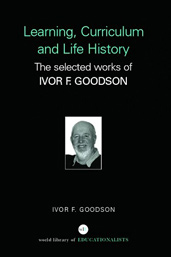Learning, Curriculum and Life Politics: the selected works of Ivor F. Goodson
Towards a Social Constructionist Perspective
Curriculum as Prescription
The primacy of the ideology of curriculum as prescription (C.A.P.) can be evidenced in even a cursory glimpse at curriculum literature. This view of curriculum develops from a belief, that we can dispassionately define the main ingredients of the course of study, and then proceed to teach the various segments and sequences in systematic turn. Despite the obvious simplicity, not to say crudity of this view the 'objectives game' is still, if 'not the only game in town', certainly the main game. There may be many reasons for this continuing predominance, but explanatory potential is not, I think, one of the factors.
Curriculum as prescription supports important mystiques about state schooling and society. Most notably C.A.P. supports the mystique that expertise and control reside within central government, educational bureaucracies or the university community. Providing nobody exposes this mystique, the two worlds of 'prescription rhetoric' and 'schooling as practice' can co-exist. Both sides benefit from such peaceful co-existence. The agencies of C.A.P. are seen to be 'in control' and the schools are seen to be 'delivering' (and can carve out a good degree of autonomy if they accept the rules). Curriculum prescriptions thereby set certain parameters but with transgression and occasional transcendence being permissible as long as the rhetoric of prescription and management is not challenged.
Of course there are ‘costs of complicity’ in accepting the myth of prescription: above all these involve, in various ways, acceptance of established modes of power relations. Perhaps most importantly the people intimately connected with the day-to-day social construction of curriculum and schooling, the teachers are thereby effectively disenfranchised in the 'discourse of schooling'. To continue to exist their day-to-day power must basically remain unspoken and unrecorded. This then is the price of complicity. The vestiges of day-to-day power and autonomy for schools and for teachers are dependent on continuing to accept the fundamental lie.
With regard to curriculum study the ‘costs of complicity’ are ultimately catastrophic. For the historic compromise we have described has led to the displacement of a whole field of study. It has led to the directing of scholarship into fields which service the mystique of central and/or bureaucratic control. For scholars who benefit from maintaining this mystique - in the universities particularly - this complicity is, to say the least, self-serving.
